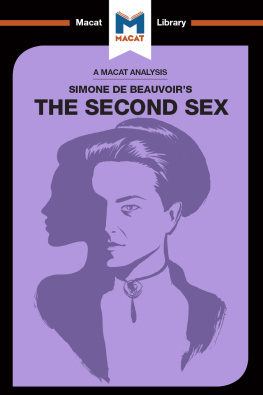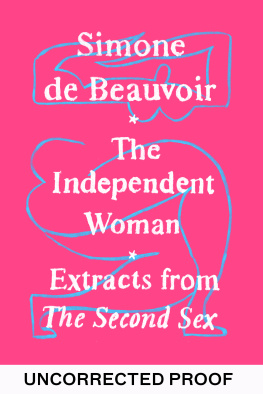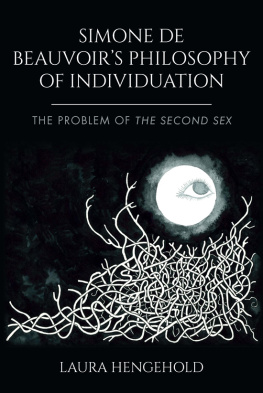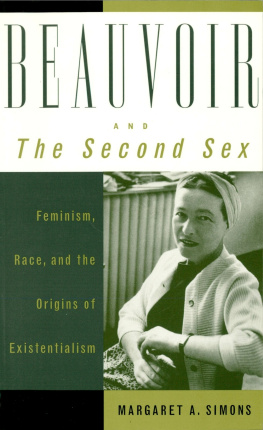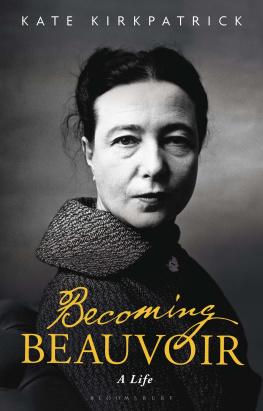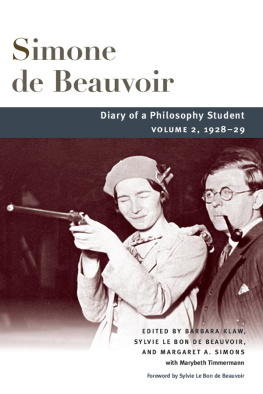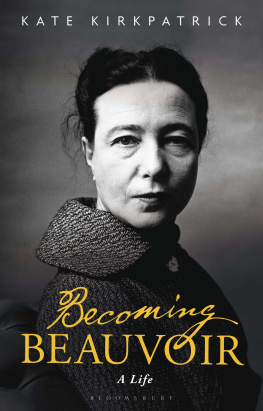Contents
Page List
Guide


An Analysis of
Simone de Beauvoirs
The Second Sex
Rachele Dini

Copyright 2017 by Macat International Ltd
24:13 Coda Centre, 189 Munster Road, London SW6 6AW.
Macat International has asserted its right under the Copyright, Designs and Patents Act 1988 to be identified as the copyright holder of this work.
The print publication is protected by copyright. Prior to any prohibited reproduction, storage in a retrieval system, distribution or transmission in any form or by any means, electronic, mechanical, recording or otherwise, permission should be obtained from the publisher or where applicable a license permitting restricted copying in the United Kingdom should be obtained from the Copyright Licensing Agency Ltd, Barnards Inn, 86 Fetter Lane, London EC4A 1EN, UK.
The ePublication is protected by copyright and must not be copied, reproduced, transferred, distributed, leased, licensed or publicly performed or used in any way except as specifically permitted in writing by the publishers, as allowed under the terms and conditions under which it was purchased, or as strictly permitted by applicable copyright law. Any unauthorised distribution or use of this text may be a direct infringement of the authors and the publishers rights and those responsible may be liable in law accordingly.
www.macat.com
info@macat.com
Cover illustration: Capucine Deslouis
Cataloguing in Publication Data
A catalogue record for this book is available from the British Library.
Library of Congress Cataloguing-in-Publication Data is available upon request.
ISBN 978-1-912302-84-0 (hardback)
ISBN 978-1-912127-58-0 (paperback)
ISBN 978-1-912281-72-5 (e-book)
Notice
The information in this book is designed to orientate readers of the work under analysis, to elucidate and contextualise its key ideas and themes, and to aid in the development of critical thinking skills. It is not meant to be used, nor should it be used, as a substitute for original thinking or in place of original writing or research. References and notes are provided for informational purposes and their presence does not constitute endorsement of the information or opinions therein. This book is presented solely for educational purposes. It is sold on the understanding that the publisher is not engaged to provide any scholarly advice. The publisher has made every effort to ensure that this book is accurate and up-to-date, but makes no warranties or representations with regard to the completeness or reliability of the information it contains. The information and the opinions provided herein are not guaranteed or warranted to produce particular results and may not be suitable for students of every ability. The publisher shall not be liable for any loss, damage or disruption arising from any errors or omissions, or from the use of this book, including, but not limited to, special, incidental, consequential or other damages caused, or alleged to have been caused, directly or indirectly, by the information contained within.
CONTENTS
THE MACAT LIBRARY
The Macat Library is a series of unique academic explorations of seminal works in the humanities and social sciences books and papers that have had a significant and widely recognised impact on their disciplines. It has been created to serve as much more than just a summary of what lies between the covers of a great book. It illuminates and explores the influences on, ideas of, and impact of that book. Our goal is to offer a learning resource that encourages critical thinking and fosters a better, deeper understanding of important ideas.
Each publication is divided into three Sections: Influences, Ideas, and Impact. Each Section has four Modules. These explore every important facet of the work, and the responses to it.
This Section-Module structure makes a Macat Library book easy to use, but it has another important feature. Because each Macat book is written to the same format, it is possible (and encouraged!) to crossreference multiple Macat books along the same lines of inquiry or research. This allows the reader to open up interesting interdisciplinary pathways.
To further aid your reading, lists of glossary terms and people mentioned are included at the end of this book (these are indicated by an asterisk [*] throughout) as well as a list of works cited.
Macat has worked with the University of Cambridge to identify the elements of critical thinking and understand the ways in which six different skills combine to enable effective thinking.
Three allow us to fully understand a problem; three more give us the tools to solve it. Together, these six skills make up the
PACIER model of critical thinking. They are:
ANALYSIS understanding how an argument is built
EVALUATION exploring the strengths and weaknesses of an argument
INTERPRETATION understanding issues of meaning
CREATIVE THINKING coming up with new ideas and fresh connections
PROBLEM-SOLVING producing strong solutions
REASONING creating strong arguments
To find out more, visit WWW.MACAT.COM.
CRITICAL THINKING AND THE SECOND SEX
Primary critical thinking skill: ANALYSIS
Secondary critical thinking skill: REASONING
Simone de Beauvoirs 1949 book The Second Sex is a masterpiece of feminist criticism and philosophy. An incendiary take on the place of women in postwar French society, it helped define major trends in feminist thought for the rest of the 20th century, and its influence is still felt today.
The books success owes much to de Beauvoirs brilliant writing style and passion, but both are rooted in the clarity of her critical thinking skills. She builds a strong argument against the silent assumptions that continually demoted (and still demote) women to second place in a society dominated by men. De Beauvoir also demonstrates the central skills of reasoning at their best: presenting a persuasive case, organising her thoughts, and supporting her conclusions.
Above all though, The Second Sex is a masterclass in analysis. Treating the structures of contemporary society and culture as a series of arguments that tend continuously to demote women, de Beauvoir is able to isolate and describe the implicit assumptions that underpin male domination. Her demolition of these assumptions provides the crucial ammunition for her argument that women are in no way the second sex, but are in every way the equal of men.
ABOUT THE AUTHOR OF THE ORIGINAL WORK
Born in Paris in 1908, Simone de Beauvoir was a gifted scholar whose radical ideas and scandalous love life shocked France and the wider world. She was at the forefront of twentieth-century existentialismthe philosophy that replaced God with personal choice. De Beauvoir was a prolific and high profile writer of philosophy, fiction, and autobiography until her death in 1986. The Second Sex, her essential book about what it means to be a woman, inspired the feminist movement.
ABOUT THE AUTHOR OF THE ANALYSIS
Dr Rachele Dini studied at Cambridge, Kings College London and University College London. Much of her current work focuses on the representation of production and consumption in modern and contemporary Anglo-American fiction. She has taught at Cambridge and for the Foundation for International Education, and is now Lecturer in English at the University of Roehampton. Her first monograph,

